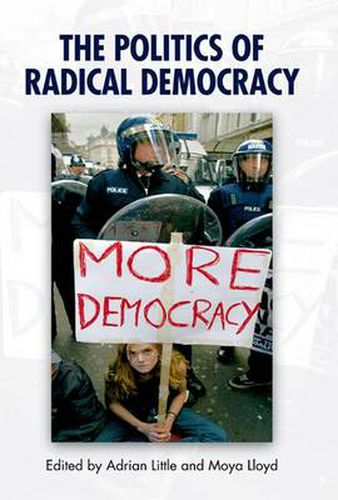Readings Newsletter
Become a Readings Member to make your shopping experience even easier.
Sign in or sign up for free!
You’re not far away from qualifying for FREE standard shipping within Australia
You’ve qualified for FREE standard shipping within Australia
The cart is loading…






This book addresses the idea of radical democracy and, in particular, its poststructuralist articulation. It analyses the approach to radical democracy taken by a number of contemporary theorists and political commentators:, including Ernesto Laclau and Chantal Mouffe, Judith Butler, William Connolly, Jacques Ranciere, Claude Lefort, Sheldon Wolin, Michael Hardt, and Antonio Negri, and Giorgio Agamben. By examining critically the critiques accounts of democracy advanced by these theorists, this volume explores how a more radically conceived theory of democracy might be extended in a more egalitarian and inclusive direction. developed. The strand of radical democracy examined in this book is defined by a number of characteristics: *Democracy is conceptualised understood as a fugitive condition, being open to perpetual disruption and reinvention *The relationship between the state and civil society is regarded as the site where the open-ended ‘promise’ of democracy is fought out *There is an emphasis on questions of political renewal *There is a deep suspicion of identity-based political claims *Politics is conceived as either the site of or as one of the mechanisms for identity construction * Democratic politics is understood as a politics of contestation and disagreement * Democracy is regarded as always at least partially conflictual and not a means through which violence and conflict can be permanently eradicated *There is a deep suspicion of identity-based political claims *The political is assumed to be ontologically conflictual, with such conflict being understood as ultimately ineradicable from politics, though the form it takes necessarily varies from time to time and context to context The book clarifies the concept of radical democracy by mapping the field, and elaborates it further through a critical engagement with the works of its key proponents. In addition, it draws on the insights of radical democratic theory to explore a range of concrete political cases (e.g. the struggles of indigenous people, same-sex marriage, societies emerging from prolonged social and political strife, and the role of social movements in opposing processes of globalization) in order to illustrate its practical nature.
$9.00 standard shipping within Australia
FREE standard shipping within Australia for orders over $100.00
Express & International shipping calculated at checkout
This book addresses the idea of radical democracy and, in particular, its poststructuralist articulation. It analyses the approach to radical democracy taken by a number of contemporary theorists and political commentators:, including Ernesto Laclau and Chantal Mouffe, Judith Butler, William Connolly, Jacques Ranciere, Claude Lefort, Sheldon Wolin, Michael Hardt, and Antonio Negri, and Giorgio Agamben. By examining critically the critiques accounts of democracy advanced by these theorists, this volume explores how a more radically conceived theory of democracy might be extended in a more egalitarian and inclusive direction. developed. The strand of radical democracy examined in this book is defined by a number of characteristics: *Democracy is conceptualised understood as a fugitive condition, being open to perpetual disruption and reinvention *The relationship between the state and civil society is regarded as the site where the open-ended ‘promise’ of democracy is fought out *There is an emphasis on questions of political renewal *There is a deep suspicion of identity-based political claims *Politics is conceived as either the site of or as one of the mechanisms for identity construction * Democratic politics is understood as a politics of contestation and disagreement * Democracy is regarded as always at least partially conflictual and not a means through which violence and conflict can be permanently eradicated *There is a deep suspicion of identity-based political claims *The political is assumed to be ontologically conflictual, with such conflict being understood as ultimately ineradicable from politics, though the form it takes necessarily varies from time to time and context to context The book clarifies the concept of radical democracy by mapping the field, and elaborates it further through a critical engagement with the works of its key proponents. In addition, it draws on the insights of radical democratic theory to explore a range of concrete political cases (e.g. the struggles of indigenous people, same-sex marriage, societies emerging from prolonged social and political strife, and the role of social movements in opposing processes of globalization) in order to illustrate its practical nature.